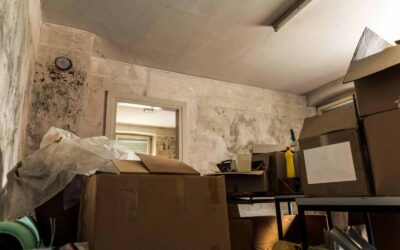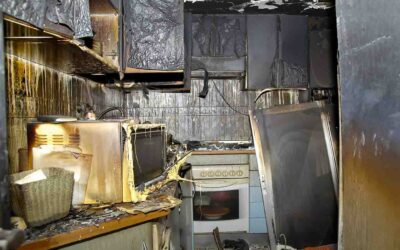Your home is built to withstand the elements, and a properly constructed and maintained house will handle that task very well. Underneath the foundations of every building, however, lies an absolutely merciless foe: ground water. Left unchecked, it can break through your home’s defenses and cause leaks and flooding, which in turn can cause major (and majorly expensive) damage.
Avoiding this issue is largely one of preventative maintenance. By learning to identify and address the common causes of ground water damage, you can often avoid letting minor items on your repair checklist turn into major home renovation projects.
In the following blog post, we’ll help you learn how to repair and mitigate the most common problems caused by ground water. In doing so, we’ll help you protect your property from both short-term damage and extensive long-term structural issues.
How Water Gets into Your Home
If you remember learning about the water cycle in elementary school, then you already know that water is constantly on the move. It enters the atmosphere through evaporation—from the surface, after rainfall, and from large bodies of water—and eventually returns to the land through precipitation in the form of rain or snow. It is then absorbed into the soil, but its movement doesn’t stop there: Water in the ground either flows deeper or makes its way back to the surface by way of hydrostatic pressure.
Water will always take the path of least resistance as it flows upward. That means if it encounters the foundations of a properly waterproofed home, it will be harmlessly redirected. However, if your home hasn’t been built or maintained properly, it may have some of the following flaws, which will allow water to begin to seep in:
Poor Drainage
When it rains or snows on and around your property, the water needs a way to drain away safely. If it is unable to do so, it will simply begin to pool, where it can either create large puddles or be absorbed into the soil as ground water. Water acts as a solvent, so if a large amount of it simply sits in one spot, it will eventually begin to penetrate and damage everything around it.
If you see water pooling around your property and you suspect a drainage problem, it can usually be addressed by digging trenches or adding gutters and downspouts to direct water away from your house.
Foundation Cracks
Good professional builders will always ensure that the foundation of a newly constructed home is properly waterproofed. Hydrostatic pressure will cause water to attempt to push its way through the concrete underneath the house. Over time, hairline cracks may begin to form, which will allow water to seep in. If these cracks are not repaired quickly, they will gradually become larger and larger, ultimately leading to major issues with ground water damage in the basement area and beyond.
Very minor cracks in the foundation can sometimes be sealed with a waterproof epoxy material. However, these areas will be weak points in the concrete slab that serves as the base on which your home is built. As pressure builds up, they may begin to leak again. That’s why it’s a good idea to have a professional contractor install a drainage system to relieve the pressure.
Weakened Walls
Water can enter your home from the sides as well. This is often a particular problem if there are weak points in the walls, especially those that border underground soil. Concrete walls often have installation points that are not as strong as the surrounding substrate. If there is enough water putting pressure on these points, it can begin to seep through the walls.
This issue can be addressed by reinforcing weak points with waterproof epoxy and other materials. Your contractor may also be able to install a barrier behind the walls, helping to redirect ground water to areas that are better protected.
Damaged Pipes
Water damage doesn’t just occur because of rain or snowfall. It can also be caused by damaged pipes in the basement or crawl space or behind the walls. You depend on these pipes to transport your water supply to every room in your home. However, they can corrode over time and eventually develop leaks. Pipes can also break after freezing weather. Since water expands as it transforms into ice, it can sometimes weaken or destroy pipes during particularly cold conditions.
Address this problem by investing in regular maintenance from a professional plumber. If you notice water stains or other signs of water damage, your plumber will often be able to tell if a damaged pipe is responsible and make the necessary repairs.
Rising Water Tables
When discussing ground water, we refer to a certain area below the surface as the “zone of saturation.” This is the point where the soil or other underground substrate is entirely saturated with water. The upper boundary of this area is known as the “water table.”
Water tables are not static; rather, they can rise and fall based on rainfall and other conditions. If the water table begins to rise to the point where it contacts the foundations of your home—which is a particular risk during especially wet seasons—then the odds of ground water breaking through and damaging the structure of your home increase dramatically.
A professional contractor can help secure your home against a rising water table by installing barriers behind vulnerable areas, as well as installing more effective drainage systems.
Repairing the Damage
Of course, sometimes ground water still breaks through despite your best preventative efforts. When this happens, it can not only damage the foundations of your home, but it can ruin everything in its path, destroying property and creating a risk of further damage and mold growth.
If you have a ground water damage problem, contact Biodynamic. We specialize in returning homes to their pre-damage condition, meaning we’ll painstakingly repair damaged areas, including both the structural elements of your home and your possessions. We’ll also help you put protections in place to prevent the issue from recurring.


